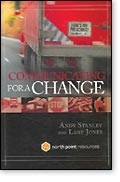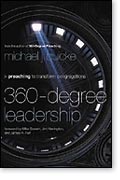Skill Builders
Article
2006 Preaching Book Awards: Skills
Effective preachers are always growing, and those who grow read.
Each year, PreachingToday.com selects two new preaching books for book-of-the-year awards: one that focuses primarily on the skills of preaching and the other on the soul of the preacher. Both are essential.
The winners this year were chosen by votes from two preaching experts and the editor of PreachingToday.com. In this article, we honor the book published in 2006 that wins the preaching skills award.
2006 Book of the Year for Preaching Skills
Communicating for a Change
Seven keys to irresistible communication
By Andy Stanley and Lane Jones
Multnomah, 2006
Whether preaching or teaching, those of us who communicate the truth of God's Word hope that our words will help others move closer to Jesus Christ. In Communicating for a Change, Andy Stanley and Lane Jones share seven imperatives designed to streamline your communication, challenge the minds of your listeners, and ultimately change their lives.
Each imperative is practical and easy to implement, although some will challenge preachers to revisit and re-evaluate old habits and practices. For example, the imperative "Pick a Point" urges speakers to focus on a single point they want to communicate, or a single goal to accomplish. Otherwise, says Stanley, "By the time you get to your last point, nobody remembers the first three."
Another innovative feature of this book is the authors' own method of communication. In the first 90 pages, Stanley and Jones weave the seven imperatives into an extended parable about an everyman pastor and his encounter with Willy Graham—an outspoken, truck-driving itinerant preacher. The rest of the chapters delve deeper into the mechanics of each imperative, focusing on their application to real-life communication.
The result is a readable book that is both entertaining and instructive, and that will ultimately help you become a better communicator of God's truth.
Book Contents
Part I
How's My Preaching?
1. No One's Listening
2. Where There's a Will There's a Ray
3. Go for the Goal
4. The End of the Road
5. A Map to Remember
6. Load Up Before You Leave
7. Crucial Connections
8. Show Me Some Identification
9. Stuck in the Middle of Nowhere
10. A New Attitude
Part II
Communicating for a Change
11. Determine Your Goal
12. Pick a Point
13. Create a Map
14. Internalize the Message
15. Engage Your Audience
16. Find Your Voice
17. Start All Over
Conclusion
Q&A with Andy
 |
 |
Interview
A few days before Christmas, PreachingToday.com associate editor Sam O'Neal had the opportunity to talk with Andy Stanley about his book and his preaching.
PreachingToday.com: When a preacher uses a template for designing a sermon, do you think it has the potential to become predictable?
Andy Stanley: Yes, but every preacher has a template, whether they're aware of it or not. So, when we recognize our template, we actually have the most freedom to depart from it. It's the person who doesn't realize what they do that ends up doing the same thing over and over. So, recognizing the pattern is really the first step to being able to break from the pattern and do some more creative things.
Do you ever deviate from the 7 imperatives? And if so, why?
Yes, I do. Certain subject matter requires it. If a sermon is more historical—like, I just did this sermon for Christmas on the virgin birth and told the whole story of Ahaz back in Isaiah 7 and had a big map up there—the content and nature of the message forces us outside of a strict regimen.
But again, having those seven things in front of me keeps me from getting stuck, and makes sure that I'm at least bringing it back to home base in terms of, "What do I do with this today?" The practical part.
I especially liked the fiction at the beginning.
Some people loved that, and some people hated it. I got e-mails saying, "I just skipped through all that junk and got to the meat." Other people said, "Oh, I loved the characters." So, I guess not everybody's the same.
Can you give our readers a few thoughts about your reasoning to start with fiction, then take a nonfiction approach?
I enjoy reading books written that way. Many years ago, my dad gave me a book called The Sermon Doctor and it was a parable book about a pastor who got in trouble and found an ad in the paper by this guy who styled himself as "The Sermon Doctor." And the whole book was basically these conversations with the Sermon Doctor and these four preachers who were trying to figure out how to preach better. It's different from our book, but it certainly gave me the idea.
Is there something in particular that you hope preachers would take away from your book?
Yeah, I guess the passion or emotion behind the whole thing is that there's just no need to be non-interesting. I just hope to kick-start the creative process. As I said earlier, every pastor has some sort of template; every pastor has a starting point for creating a message. And by trying new things, it forces us to be creative. And that just makes us better.
I've gotten some amazing e-mails from guys who have tried this. The response has been overwhelming.
If there were one imperative from the book that you hope preachers would catch on to, which would it be?
If I just had to force myself to pick one, it would be that we should Pick a Point. Because, most sermons I hear, I think: You gave me a whole series! Any one of those things would have been enough. And of course, we tend to only remember the last point anyway, so why not just camp out there?
Honorable Mention
360 Degree Leadership
Preaching to transform congregations
By Michael Quicke
Zondervan Publishing
Many books have explored the role of the pastor as leader, and others have taught the practices of effective preaching. But should these two juggernauts of the church remain separate? Not according to Michael Quicke.
His thought-provoking book is a call for pastors to reject a view of homiletics that does not include vision and motivation (what he calls "thin-blooded preaching"). Instead, he encourages pastors to embrace leadership through their preaching. Only then, according to Quicke, can preachers become a driving force in the Christ-centered transformation of their congregations.











